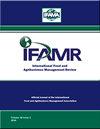智能手机使用对生产外包的影响:来自中国南方荔枝种植的证据
IF 1.5
4区 经济学
Q3 AGRICULTURAL ECONOMICS & POLICY
International Food and Agribusiness Management Review
Pub Date : 2022-03-28
DOI:10.22434/ifamr2021.0155
引用次数: 0
摘要
大量证据表明,信息通信技术(ICT)和农业生产外包可以提高农业生产率和农民福利。然而,人们对现代信息通信技术的使用与农业生产外包之间的关系知之甚少。根据对中国南方855名荔枝种植者的调查,本研究估计了智能手机使用对农民决定农业生产外包的影响。采用一种新的遗传匹配方法来减轻与自我选择智能手机使用相关的选择偏差。我们的研究结果证实了智能手机的使用在增加荔枝种植者外包的生产任务数量方面的积极作用。此外,智能手机用户比非用户更有可能将劳动密集型和技术密集型任务外包出去。此外,使用智能手机的治疗效果因荔枝生产任务的不同而不同。我们的研究结果强调了提高农民智能手机普及率以促进农业生产外包的重要性。本文章由计算机程序翻译,如有差异,请以英文原文为准。
Impact of smartphone use on production outsourcing: evidence from litchi farming in southern China
There is a great deal of evidence suggesting that information and communication technology (ICT) and agricultural production outsourcing can improve farm productivity and farmers’ welfare. However, less is known about the relationship between modern ICT use and agricultural production outsourcing. Drawing upon a survey of 855 litchi growers from southern China, this study estimates the effect of smartphone use on farmers’ decisions regarding agricultural production outsourcing. A novel genetic matching method is employed to mitigate the selection bias associated with self-selected smartphone use. Our result confirms the positive role of smartphone use in increasing the number of production tasks outsourced by litchi growers. Moreover, smartphone users are more likely to outsource both labor-intensive and technology-intensive tasks than nonusers. In addition, the treatment effect of smartphone use varies with each specific litchi production task. Our findings highlight the importance of improving smartphone adoption among farmers to promote agricultural production outsourcing.
求助全文
通过发布文献求助,成功后即可免费获取论文全文。
去求助
来源期刊

International Food and Agribusiness Management Review
AGRICULTURAL ECONOMICS & POLICY-
CiteScore
2.90
自引率
0.00%
发文量
0
审稿时长
>12 weeks
期刊介绍:
The IFAMR is an internationally recognized catalyst for discussion and inquiry on issues related to the global food and agribusiness system. The journal provides an intellectual meeting place for industry executives, managers, scholars and practitioners interested in the effective management of agribusiness firms and organizations.
IFAMR publishes high quality, peer reviewed, scholarly articles on topics related to the practice of management in the food and agribusiness industry. The Journal provides managers, researchers and teachers a forum where they can publish and acquire research results, new ideas, applications of new knowledge, and discussions of issues important to the worldwide food and agribusiness system. The Review is published electronically on this website.
The core values of the Review are as follows: excellent academic contributions; fast, thorough, and detailed peer reviews; building human capital through the development of good writing skills in scholars and students; broad international representation among authors, editors, and reviewers; a showcase for IFAMA’s unique industry-scholar relationship, and a facilitator of international debate, networking, and research in agribusiness.
The Review welcomes scholarly articles on business, public policy, law and education pertaining to the global food system. Articles may be applied or theoretical, but must relevant to managers or management scholars studies, industry interviews, and book reviews are also welcome.
 求助内容:
求助内容: 应助结果提醒方式:
应助结果提醒方式:


